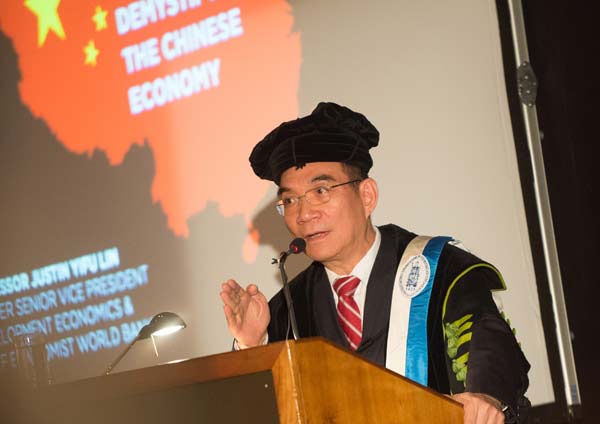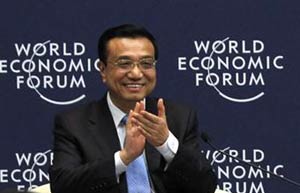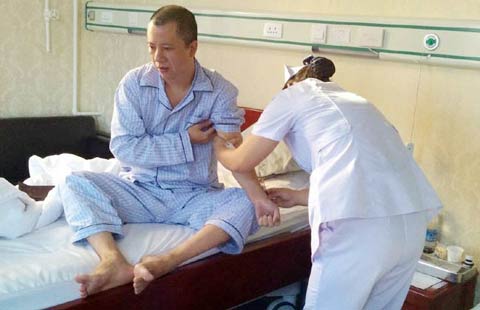Lin: Recession risks rising in Europe
Updated: 2014-09-10 07:56
By FU JING(China Daily)
|
|||||||||||
 |
|
Chinese economist Justin Yifu Lin delivers a speech after recieving an honorary doctorate awarded by the Vlerick Business School and the Catholic University of Leuven in Belgium on Monday evening. [Photo provided to chinadaily.com.cn] |
He said following the recent ECB policy moves, the euro has weakened further. The combination of a weak European economy and the euro will have a negative impact on China as many of its businesses are still reliant on exports to the EU.
Filip Abraham, professor of international economics at the Vlerick Business School in Brussels, said Lin's judgment is correct as growth rates in most of the eurozone nations are around 0-0.5 percent.
"The figures have shown that the eurozone is not that far away from a recession. However, this will also largely depend on what will happen in Germany," Abraham said.
Talking of the fallout from an impending recession, Abraham said it would lead to the EU importing less products from China and Chinese enterprises slowing their investment plans in the EU, something that had gathered pace since 2008-09.
To help the global economy grow at a faster pace, Lin said it is important for the major economies to consider a "grand plan of infrastructure construction" to shake off economic stagnation and crisis.
Lin said Europe still has some room to improve its infrastructure and such a measure would boost its exports of technology and products.
China has charted plans to become "better connected" with other countries and is encouraging several African countries to build roads, railways and airports with capital and technical inputs.
"Such measures can help dispel fears that the euro and dollar would competitively depreciate and also help the world stave off economic stagnation," said Lin.
Key points from Lin
・ China has the potential to maintain annual growth of 8 percent for the next 20 years if deepening domestic reforms are successful and global conditions permit.
・ China must come to terms with three major challenges: income disparities, corruption and pollution.
・ Lessons from China's economic takeoff can be copied by some African countries. China's dual-track approach to reform, which involves transitory protection for nonviable companies to maintain stability while liberalizing sectors where the country has comparative advantages, can be taken as experience for development.
・ Decisions by the Ethiopian leadership and the successful shift of China's shoe-producing and other plants to Ethiopia have proved that Africa has great potential it can tap to achieve a dynamic economy.
・ In shifting manufacturing to Africa, China and Europe can also benefit because they can offer technology, capital and export markets.
 |
 |
| Premier Li to attend Summer Davos forum |
|
Related Stories
Call made for special currency 2014-01-29 02:38
China's 8% growth to last for another 20 yrs: Lin 2012-09-11 16:14
Lin suggests fiscal policy in securing growth 2012-06-22 10:31
World Bank's Justin Lin leaves post 2012-06-05 14:28
Economists, officials' comment on economy 2012-09-17 11:10
Chinese economy operating within reasonable range: premier 2014-09-09 20:18
Today's Top News
Nation capable of hitting growth targets, Li says
Chinese peacekeepers to support South Sudan
Obama orders airstrikes in Syria for first time
Putin blames West for Ukraine crisis
Cameron 'heartbroken' if UK split
Russia lays responsibility for MH17 crash on Ukraine
Space station eyes cooperation with other countries
China restricts overseas TV
Hot Topics
Lunar probe , China growth forecasts, Emission rules get tougher, China seen through 'colored lens', International board,
Editor's Picks

|

|

|

|

|

|





